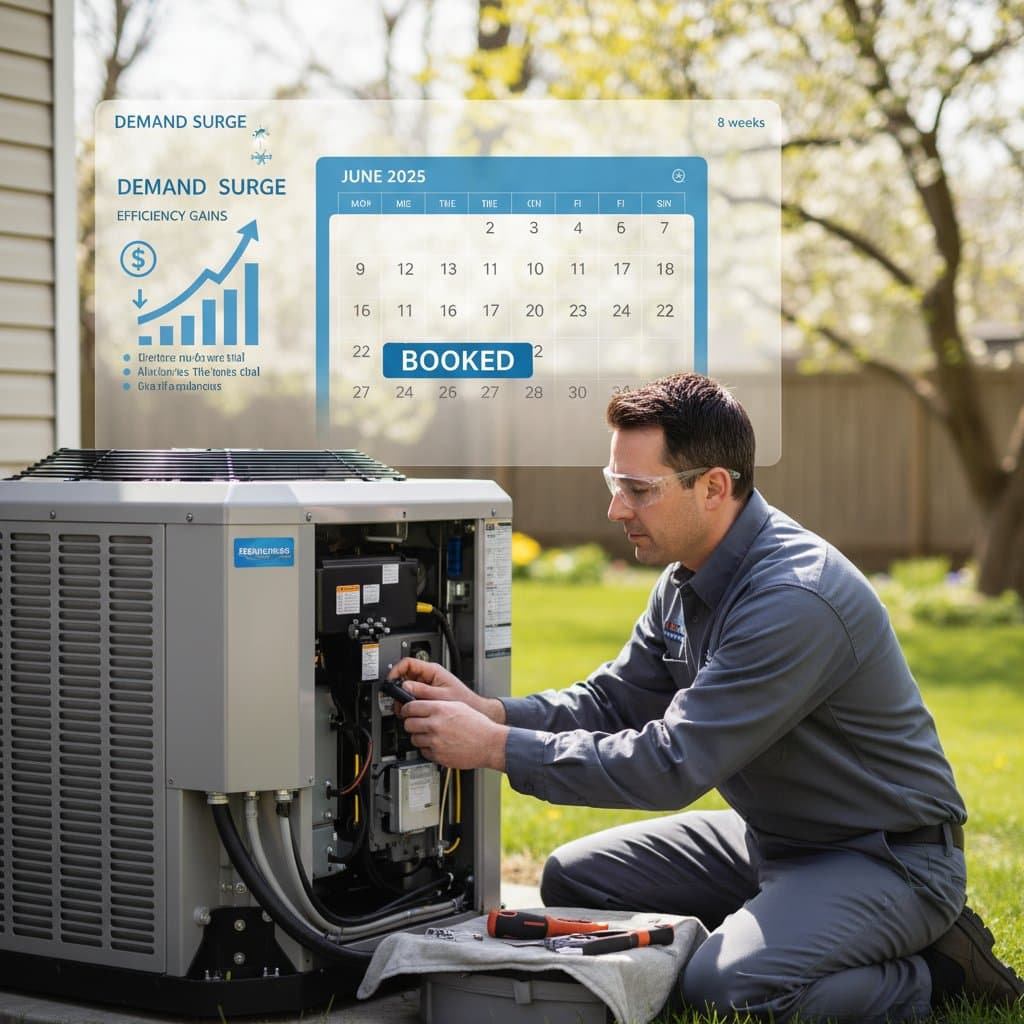Why Spring HVAC Technicians Book Up Eight Weeks in Advance
Warm weather prompts homeowners to arrange spring HVAC tune-ups promptly. This surge in requests results in technicians scheduling appointments weeks ahead. Many individuals encounter unavailability when delaying calls. The following sections explain the reasons for rapid booking in spring and provide strategies for proactive planning to maintain home comfort.
Factors Driving the Spring Surge in HVAC Demand
Spring marks the transition to cooling season after extended heating periods. Homeowners shift attention to air conditioning preparation, generating numerous service inquiries. This timing creates intense pressure on service availability, particularly in regions with fluctuating temperatures.
Several specific factors contribute to this overload:
- Preventive Maintenance Routines: Homeowners arrange inspections to verify system readiness for summer heat, often including comprehensive checks on components like compressors and fans.
- Accumulated Winter Damage: Systems endure heavy use during cold months, leading to issues such as corroded coils or strained motors that require attention before cooling demands increase.
- Focus on Energy Efficiency: Escalating energy costs motivate tune-ups to optimize performance, such as sealing duct leaks or upgrading to variable-speed blowers for reduced consumption.
- Allergy and Air Quality Management: Pollen influx with warmer air encourages requests for advanced filtration systems or UV lights to improve indoor air and alleviate seasonal discomfort.
These elements collectively strain technician schedules, making advance planning essential for timely service.
Insights into the HVAC Technician Shortage
Beyond seasonal demand, the industry grapples with a persistent lack of skilled professionals. Retirements outpace new entrants, as vocational training demands two to four years for full certification in heating, ventilation, and air conditioning systems. Not all technicians possess dual expertise in both heating and cooling, further limiting availability.
This scarcity impacts daily operations. Service providers manage high volumes of inquiries, often prioritizing based on urgency. During peak periods, calendars fill rapidly, with appointments extending six to eight weeks forward. Companies mitigate this through optimized routing software, yet the fundamental gap persists, underscoring the value of early outreach.
Benefits of Scheduling HVAC Service Early
Arranging maintenance ahead of the rush extends beyond mere convenience. It safeguards system reliability and financial well-being. Consider these key advantages when planning:
- Evade Premium Emergency Charges: Last-minute fixes incur additional fees, sometimes doubling standard rates during high-demand times.
- Select Optimal Time Slots: Early reservations allow alignment with personal calendars, avoiding conflicts with work or family obligations.
- Minimize Risk of System Failures: Proactive care detects issues like low refrigerant or faulty capacitors, preventing disruptive outages in peak summer.
- Enhance Operational Efficiency: Cleaned and calibrated units operate at peak performance, potentially cutting energy use by 10 to 15 percent and lowering utility statements.
By initiating contact before temperatures escalate, homeowners position their systems for optimal function precisely when needed.
Details of a Comprehensive Spring HVAC Tune-Up
A thorough HVAC tune-up involves systematic evaluation and upkeep to promote longevity and efficiency. Technicians follow established protocols to address potential vulnerabilities. This process typically spans one to two hours, depending on system complexity.
Key activities include:
- Cleaning evaporator and condenser coils to remove accumulated dirt, alongside filter replacements to restore unrestricted airflow.
- Assessing refrigerant levels and performing precise recharges to maintain cooling capacity without excess strain.
- Securing electrical components, such as tightening wiring and inspecting capacitors to prevent short circuits.
- Calibrating thermostats and control boards for accurate temperature regulation and automated operation.
- Measuring airflow rates and temperature differentials across the unit to confirm balanced distribution throughout the home.
Technicians document observations and discuss findings, recommending targeted repairs like belt replacements or insulation additions. This transparency empowers homeowners to make informed decisions about system health.
Frequently Asked Questions
How Far in Advance Should One Schedule HVAC Maintenance?
Aim to book at least eight weeks prior to anticipated regular cooling use, such as mid-April for most regions. This timeframe secures preferred dates and allows preparation for any identified needs.
What Are the Consequences of Skipping a Spring Tune-Up?
Neglecting service increases vulnerability to inefficiency, with potential rises in energy costs up to 20 percent from dirty components. Comfort levels decline due to uneven cooling, and breakdowns become more likely, often requiring costlier interventions.
Is DIY HVAC Maintenance Advisable?
Basic tasks like filter changes, outdoor unit debris clearance, and vent inspections fall within homeowner capabilities using simple tools. However, tasks involving electrical systems, refrigerants, or internal disassembly demand professional intervention to avoid hazards like leaks or shocks.
How to Handle Repairs Needed During Peak Season?
Contact the service provider immediately and describe symptoms in detail, such as unusual noises or inadequate cooling. Providers reserve slots for critical issues, enabling faster response compared to routine requests.
Secure Your Spring Maintenance Appointment for Lasting Efficiency
Proactive scheduling of annual HVAC service forms the foundation of reliable home climate control. This approach not only averts scheduling frustrations but also prolongs equipment life by addressing wear proactively. Homeowners who act early enjoy sustained comfort, reduced operational costs, and fewer disruptions. Reach out to a reputable local provider, such as Obie Heat and Air, to arrange your tune-up and prepare confidently for the season ahead.





